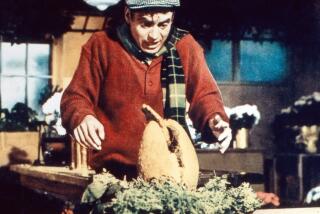Derek Jarman; Critically Praised British Filmmaker
- Share via
Derek Jarman, the iconoclastic enfant terrible of low-budget British filmmaking who matured to earn international critical praise and peer respect, has died in London. He was 52.
Jarman, who was outspoken about his own and others’ homosexuality, died Saturday of AIDS.
He had gone public with the news that he was HIV-positive in 1987, and his last project, a film titled “Blue” to be shown on British television next fall, details his experience with AIDS.
The son of a World War II bomber pilot who ran Rome’s airport after the war, Jarman spent part of his childhood in Italy where he was influenced by Italian filmmakers.
He studied at Slade School of Fine Art and began his career as a painter and a set and costume designer for ballet and opera. He moved into film by designing sets for director Ken Russell’s “The Devils” in 1971 and “Savage Messiah” in 1972.
Jarman began making his own films in the 1970s, often stressing homosexual themes and priding himself on low-budget, non-mainstream work. His films best known to California audiences include “Sebastiane” in 1976, “The Tempest” in 1979, “Caravaggio” in 1986, “War Requiem” in 1989 and “Edward II” in 1991.
His other films include “Jubilee” in 1978, “Imagining October” in 1984, “The Last of England” in 1986 and “The Garden” in 1990.
“I don’t really want to make big feature films or use big feature actors,” Jarman told The Times in 1979. “I like to have people around me I know and trust. I know how they move, how they work.
“If I get into that $5-million stuff all the fun will go out of it,” Jarman said. “I see myself as very much on the fringe. I want to make small films happily.”
When Jarman’s interpretation of Shakespeare’s “The Tempest” opened at the Vista Hollywood in 1981, Times film critic Kevin Thomas evaluated it simply as “the pits.”
“What’s unforgivable about ‘The Tempest,’ ” Thomas wrote, “is not that it’s a travesty but simply that it’s such a pretentious, bloody bore.”
But what a difference a decade made. When “War Requiem” hit the local screen in 1990, Thomas greeted it as “a remarkably evocative and powerful film (by) England’s premier experimentalist.”
The critic called the film “evidence of a new maturity in a onetime enfant terrible who once was more likely to drive you up the wall--or up the aisle--than to move you with his commanding sense of the visual.”
A noted author as well as director, Jarman sparked controversy in 1991 when he wrote a letter in the Guardian newspaper criticizing Shakespearean actor Ian McKellen for accepting a knighthood.
“As a queer artist,” Jarman wrote, “I find it impossible to react with anything but dismay to his acceptance of the honor from a government which has stigmatized homosexuality. . . . I think it’s a co-option.”
Jarman’s books include “Dancing Ledge,” “The Last of England,” and two memoirs, “Modern Nature” and “At Your Own Risk.”
* APPRECIATION: In Calendar
More to Read
Only good movies
Get the Indie Focus newsletter, Mark Olsen's weekly guide to the world of cinema.
You may occasionally receive promotional content from the Los Angeles Times.










